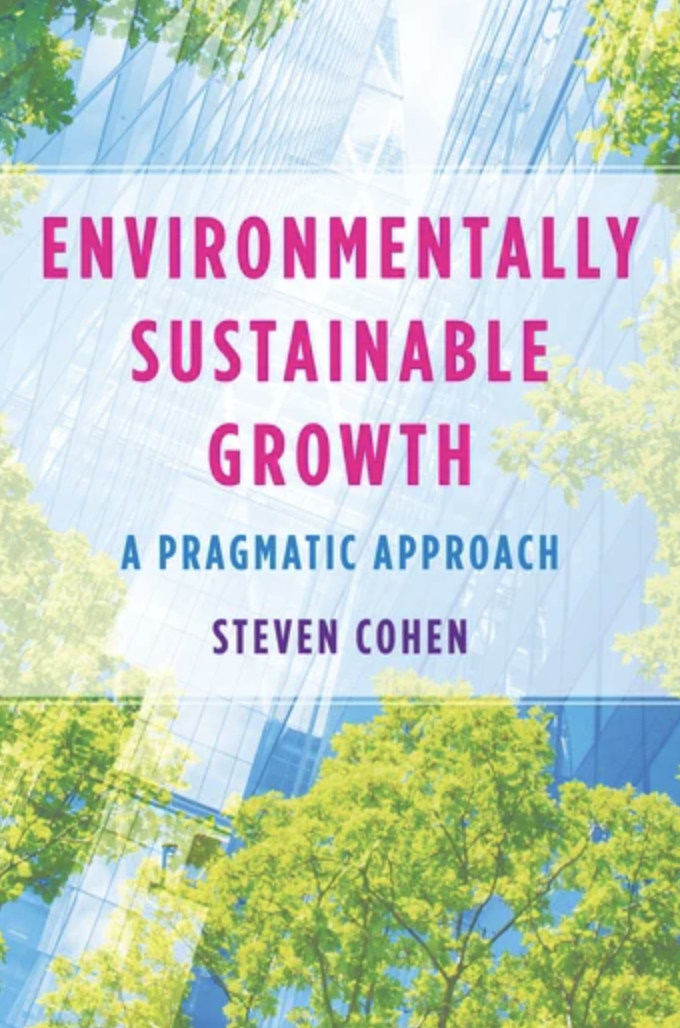
Corporations are more likely to embrace sustainability when it benefits the bottom line. That isn’t surprising considering they are ultimately in business to make a profit. For many, purpose may very well come in second — if at all. Still, there's more than one way to encourage businesses to do better by people and the planet.
TriplePundit spoke with Dr. Steven Cohen, a professor of public affairs at Columbia University and author of the new book "Environmentally Sustainable Growth," about how the profit motive can catalyze the desired effect where shame and guilt have failed.
Incentivizing sustainability can be easier than it sounds
The best way to make corporations behave is by creating an environment in which doing so will help them make more money, Cohen argues. “In some cases, you don't have to do anything other than educate people and say, you know, this will be a profitable item," he told TriplePundit.
Cohen advocates for a carrot instead of a stick approach. He’s hopeful that making good behavior profitable will hasten more wide-sweeping changes at the business level than punishing or charging companies for the negative impacts they have. And he’s not alone in that opinion.
“Sustainability is on the cusp of an evolutionary leap,” Georgia Makridou of the ESCP (École Supérieure de Commerce de Paris) Business School wrote in an impact paper on the challenges confronting sustainable energy companies and their resulting tactics. “Sustainable companies are becoming the new norm as those that have a well-rounded approach to sustainability can see wide-ranging growth opportunities.”
That’s because many business leaders now see that sustainable practices can actually lower their operating costs in the long run — and that naturally leads to increased profits, Cohen explained. Additionally, doing the right thing resonates with consumers — especially those in younger generations — and promotes brand loyalty over time.
Further, employees want to work for companies that align with their values. “If I'm in a business that requires talented engineers, talented designers and and so forth, to attract those people, I have to be a company they want to work for," Cohen said. "That's also incentivizing companies to start behaving this way: If you want to attract the best brains out there, then companies are under internal pressure to behave and to start focusing on their energy use and their waste and pollution.”

Major companies reap cost savings through sustainability, while creating measurable impact that matters
Cohen gave examples of major multinational companies that moved toward sustainable practices because they foresaw a financial benefit. For example, “Walmart discovered they have a lot of flat roofs," he said. All that space adds up vast solar energy potential — and Walmart and its big-box competitor, Target, are on the job.
Together, they're the top two business installers of onsite solar. "In their case, you don’t have to do anything. They just had to internally figure out this was going to help them make money," Cohen said. If fully harnessed, Walmart's available roof space at stores across the country could produce enough solar energy to power more than 842,000 homes, according to the nonprofit Environment America.
This month Walmart also teased new plans to roll out electric vehicle charging stations at thousands of stores across the U.S. The move will help bring in shoppers, while making EV charging more accessible to millions of people in towns large and small.
One of the country's top agricultural producers, Land O'Lakes, also cut its footprint through cost reduction measures. The company uses satellite telemetry, artificial intelligence, and robotics to ensure it doesn't waste inputs like water, pesticides and fertilizer — using only what's needed and none of what's not. "They've now created a much more efficient form of agriculture, which also just so happens to cost less and pollute less," Cohen said.
Apple’s engagement in sustainability came out of a need to satisfy its customer base. “[Young people] started to make the demand that Apple reduce the pollution [associated with] their products, and Apple has done that dramatically over the last 10 years," Cohen said. He cited the company’s buyback program and the fact that it hired a former Environmental Protection Agency administrator to manage its environmental endeavors as examples. “It's not required by the government, but in order to meet their market, they have to do that,” he said.
Incentives and regulations work. Shame and guilt doesn't, this expert says.
That’s not to say there isn’t room for regulations — there still needs to be rules of the road. The key is a good balance between government regulations and the incentives provided by an improved profit margin, Cohen said.
“What doesn't work is trying to shame people, to shame companies," he argued. "People want to live their lives, and companies want to make money. I think that green principles are most effective when they line up with the self interest of people and of corporations. And when that happens, you see a lot of activity.”
As for how to shift from a scapegoating and punishment approach to one that focuses on financial rewards: “Instead of thinking about the company as an enemy, you think about the company as a partner," Cohen said. "And the only way they're going to be a partner is if they see they're gonna make money out of it.”
Image credit: THIS IS ZUN/Pexels

Riya Anne Polcastro is an author, photographer and adventurer based out of Baja California Sur, México. She enjoys writing just about anything, from gritty fiction to business and environmental issues. She is especially interested in how sustainability can be harnessed to encourage economic and environmental equity between the Global South and North. One day she hopes to travel the world with nothing but a backpack and her trusty laptop.














